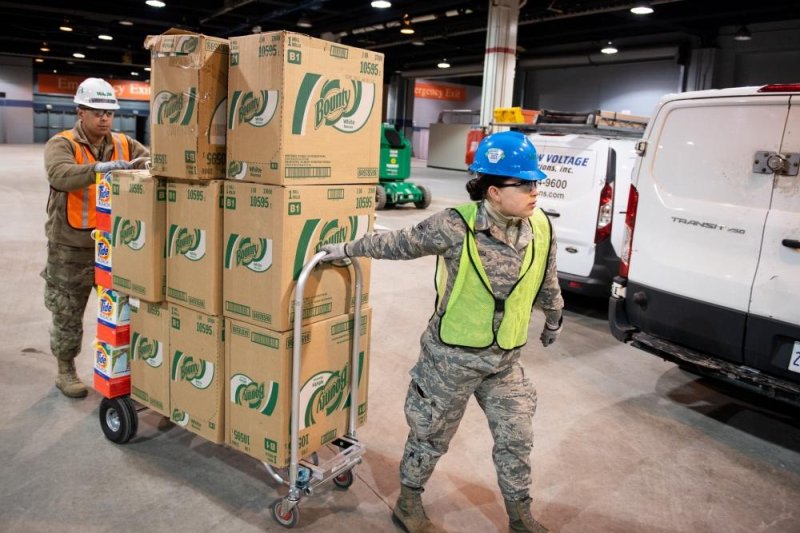Members of the Illinois Air National Guard assemble medical equipment at the McCormick Place Convention Center in response to the COVID-19 pandemic in Chicago in April. Photo by Jay Grabiec/U.S. National Guard
Aug. 4 (UPI) -- National Guard troops serving coronavirus relief missions throughout the country will have their deployments extended through the end of the year, the White House announced this week.
But the extension doesn't come with the funding 42 U.S. governors asked for Monday.
Per a White House memo issued Monday night, the federal government will only fully fund deployments to Florida and Texas.
Most other states will have federal funding terminated by Aug. 21, with the federal government funding 75 percent of assistance activities through the end of the year, the memo said.
That leaves states on the hook for the other 25 percent of costs.
The National Governors Association wrote a letter Monday asking the Trump administration to continue funding Guard deployments for COVID-19 relief on Title 32 status, which provides funding for troops to complete missions approved by the Federal Emergency Management Agency.
The letter was signed by the governors of 39 states and 3 territories, Puerto Rico, Guam and the Northern Mariana Islands.
Title 32 status provides troops with federal benefits and pay not afforded by state status, including education and health care benefits, a housing allowance and benefits associated with retirement.
About 25,000 National Guard troops are currently detailed to provide assistance fighting the coronavirus, assisting with contact tracing, testing and construction of field hospitals.
"I never envisioned that members of the Guard would be playing the roles they're still playing," Brig. Gen. J. Roy Robinson, the leader of the National Guard Association, told Politico. "They haven't been able to take a breath or back away. States went into this thing with the hope that they could mostly manage and get through it, but people realizing that this is truly a national pandemic."
State and federal leaders have criticized the administration's move, especially as states experience falling revenues attributed to the pandemic.
"I oppose a half measure," said Rep. Adam Smith, D-Wash., the chair of the House Armed Services Committee. "I'm worried the White House is trying to downplay the severity of both the virus and the economic crisis. They think if they don't acknowledge it, it will go away. But that's incredibly dangerous. There are many states that need that help."















